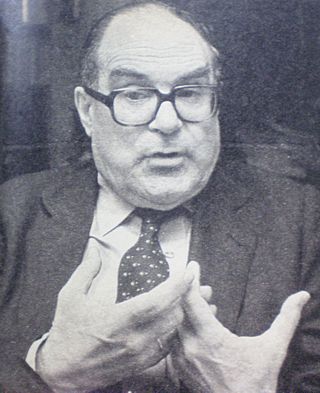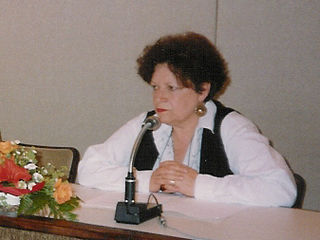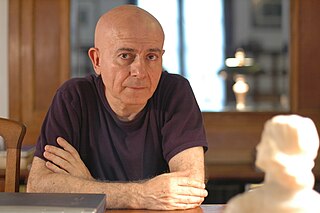Related Research Articles
Roberto Fernández Retamar was a Cuban poet, essayist, literary critic and President of the Casa de las Américas. In his role as President of the organization, Fernández also served on the Council of State of Cuba. An early close confidant of Che Guevara and Fidel Castro, he was a central figure in Cuba from the 1959 Revolution until his death in 2019. Fernández also wrote over a dozen major collections of verse and founded the Casa de las Americas cultural magazine.
José Gaos was a Spanish philosopher who obtained political asylum in Mexico during the Spanish Civil War and became one of the most important Mexican philosophers of the 20th century. He was a member of the Madrid School.

Julián Marías Aguilera was a Spanish philosopher associated with the Generation of '36 movement. He was a pupil of the Spanish philosopher José Ortega y Gasset and member of the Madrid School.

Gaucho literature, also known as gauchesco ("gauchoesque") genre was a literary movement purporting to use the language of the gauchos, comparable to the American cowboy, and reflecting their mentality. Although earlier works have been identified as gauchoesque, the movement particularly thrived from the 1870s to 1920s in Argentina, Uruguay and southern Brazil after which the movement petered out, although some works continued to be written. Gauchoesque works continue to be read and studied as a significant part of Argentine literary history.

Juan Gelman was an Argentine poet. He published more than twenty books of poetry between 1956 and his death in early 2014. He was a naturalized citizen of Mexico, country where he arrived as a political exile of the Process, the military junta ruling Argentinia from 1976 to 1983.

Miguel Ángel Virasoro (1900–1966) was an Argentine philosopher.

Arturo Carrera is an Argentine poet.

Beatriz Sarlo is an Argentine literary and cultural critic. She was also founding editor of the cultural journal Punto de Vista. She became an Order of Cultural Merit laureate in 2009.

Juan David García Bacca was a Spanish-Venezuelan philosopher and university professor. He was born in Pamplona on June 26, 1901, and died on August 5, 1992, in Quito, Ecuador. Bacca began his education under the Claretians and was ordained as a priest in 1925. He continued his studies at the University of Munich, the University of Zurich, and the University of Paris. However, during the 1930s, he left the Church and pursued philosophy at the University of Barcelona. In 1936 after criticizing Francisco Franco, Bacca was forced to live in exile. He first traveled to Ecuador where he taught at the Central University of Ecuador (1939-1942). While in Ecuador he became close friends with a writer named Alfredo Pareja Diezcanseco. He then went to Mexico where he taught at UNAM from 1942 to 1946. He eventually established himself in Venezuela in 1946 and was granted citizenship in 1952. Bacca was a professor at the Central University of Venezuela until his retirement in 1971. He was recognized for his life's work and was awarded the National Prize for Literature in 1978.
Miguel Ángel Garrido Gallardo is a Spanish philologist and semiotician. He is the adopted son of the town of Los Santos de Maimona. He is a professor of research at the Consejo Superior de Investigaciones Cientificas (CSIC) [National Council for Scientific Research] in Madrid and distinguished university professor.

José Bergamín Gutiérrez was a Spanish writer, essayist, poet, and playwright. His father served as president of the canton of Málaga; his mother was a Catholic. Bergamín was influenced by both politics and religion and attempted to reconcile Communism and Catholicism throughout his life, remarking "I would die supporting the Communists, but no further than that."

Manuel del Cabral was a Dominican poet, writer, and diplomat. The son of Mario Fermín Cabral y Báez, an influential senator during the "Era of Trujillo", he served at the Embassy of the Dominican Republic to Argentina. During his long stay in Buenos Aires, he married an Argentine and fathered his 4 children, among them, the television journalist and politician Peggy Cabral. In 1992 he was awarded the Premio Nacional de Literatura.

Andrés Chabrillón was an Argentine poet, writer, lecturer and literature professor of French descent.
Raimundo Lida (1908–1979) was an Argentine philologist, philosopher of language, literary critic and essayist. He specialised in Romance philology, aesthetics, the literature of the Spanish Golden Age and modernist literature. He taught at Harvard University from 1953, where he was chair of the department of Romance Languages. The second of three children, his siblings were the hematologist Emilio Lida and María Rosa Lida de Malkiel, also a philologist.

Carlos Cossio was an Argentinian militant university reformer, jurist, lawyer, legal philosopher and professor. One of his most important works is the concept of the Egological Theory of Law.

Carlos Alberto Leumann (1886–1952) was an Argentine poet, teacher, and essayist. He wrote essays on science and metaphysics, and was the director of the literary supplement in La Nación. His poems have been published in Spanish language anthologies.

Luisa Futoransky is an Argentine writer, scholar and journalist living in France.

Sheila Leirner is a French Brazilian curator, journalist, and art critic, as well as a writer. She was chief curator of the XVIII and XIX São Paulo Art Biennials.

Hugo Mujica is an Argentine Catholic priest, poet, writer, and former Trappist monk.
Ladislao Pablo Győri is an Argentine engineer, digital and visual artist, essayist and poet, most known as the creator of Virtual Poetry in 1995, which has been described as "of utmost significance in advancing literature as sculptural object in electronic space". He has been described as one of the rare "poet-practitioners dedicated to 3-D art".